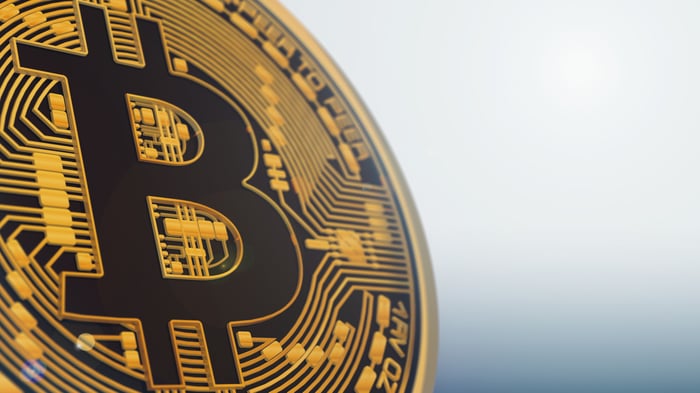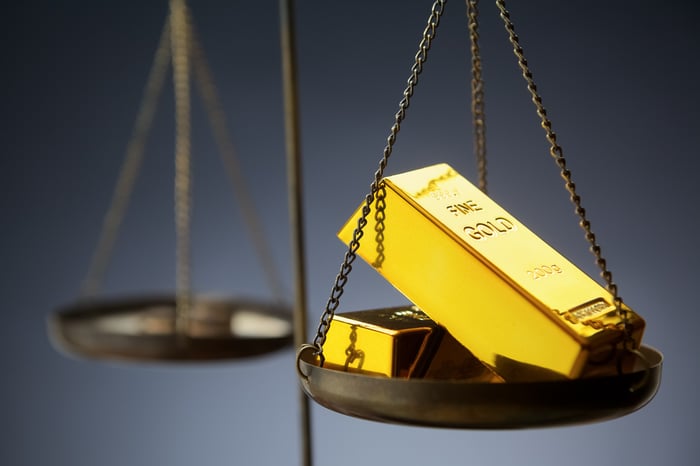It's been more than eight years since bitcoin became an investible cryptocurrency, and oh what a ride it's been. Between March 2010 and mid-December 2017, the value of an individual bitcoin token surged from a low of $0.003 to (briefly) more than $20,000 per token. A prescient $1,000 investment in March 2010, assuming you could find someone willing to part with that many bitcoin (333,333 tokens), would have been worth billions of dollars as of this past December.
Cryptocurrency optimists view bitcoin and blockchain technology as a game-changers for monetary theory and how currency is transferred from one party to another, which is a big reason bitcoin has been so successful thus far.

Image source: Getty Images.
Bitcoin's underlying blockchain is its digital, distributed, and decentralized ledger that works around traditional banking networks to record and process transactions. Most notably, blockchain offers the ability to transfer funds from one party to another considerably quicker than with current banking networks, especially in cross-border transactions. Sending funds overseas may take moments to validate and settle with blockchain, whereas traditional banking networks may take up to five business days to settle cross-border remittances.
Stop comparing bitcoin to gold! They're nothing alike
The world's largest cryptocurrency by market cap has also drawn regular comparisons to gold, which is viewed as the go-to investment anytime fear, volatility, and/or inflation rear their heads. This comparison takes shape given the relative scarcity of each asset. In other words, there's a 21-million-coin limit on the number of bitcoin that can be mined, just as there's a limit on the amount of gold that can be mined from our planet. Therefore, the assumption has been made that bitcoin can act as a store of value much in the same way gold has for investors.
However, I'm here to tell you, again, and for the last time, that you shouldn't believe everything you hear about bitcoin. It isn't, and will never be, the "new gold." How do I know this? The answer lies in a number of comparative tests that bitcoin simply fails when put side by side with gold.

Image source: Getty Images.
There's absolutely no application comparison
To begin with, there's the application of gold versus bitcoin. Bitcoin exists in the digital realm as code. It's not tangible. You can't put it in your hand or do anything with it, aside from using it as a medium of exchange, or hoping that someone else comes along at a later date and pays more for it, per token, than you did.
On the other hand, gold is a physical asset that can be held in the palm of one's hand. It also has practical uses, such as being a conductor in electronic equipment, as the primary metal in fine jewelry, and as crowns in the cosmetic dental industry, to name a few uses. One asset is tangible and has practical use, the other exists entirely within the digital realm. Not comparable.
A false sense of scarcity
Another comparison that fails to hold muster is scarcity. When it comes to gold, all we're ever going to have is what's on this planet. Putting aside science fiction hype of mining asteroids, what we have in the ground and have already mined is all the gold we're ever going to get. That provides a true physical cap on gold, allowing investors to make a genuine case for scarcity.
Meanwhile, bitcoin does have a 21-million-coin cap, but this is only limited by protocols. Admittedly, getting consensus on bitcoin's network to increase the coin limit would be very difficult -- but the point is that it's not impossible. We can't wave a wand and make more gold appear out of thin air, but computer coders with the backing of the bitcoin community could do just that and create more bitcoin.

Image source: Getty Images.
To add to this point, even without increasing the coin limit above 21 million, bitcoin's numerous hard forks essentially violate the idea of a token limit and scarcity. Bitcoin has had three instances since August where a disagreement between developers on the future path of bitcoin and its blockchain resulted in the creation of a new currency. These spinoffs of sorts -- Bitcoin Cash, Bitcoin Gold, and Bitcoin Private -- topple the idea of true scarcity, as new coins have been, or could continue to be, created from bitcoin.
Gold has history on its side
In terms of which asset has history on its side, that, too, goes to gold. Gold has been used as a currency for more than 2,700 years and is today a highly liquid asset, at least in terms of futures contract trading. It's also an asset held by central banks all over the globe. While you're not likely to pay for your morning cup of coffee with a gold ingot, gold has been viewed as an accepted form of currency for a long time.
However, bitcoin doesn't have that tenured history. There are no fundamental tethers that allow investors to make a reasonable determination about bitcoin's value, and liquidity on bitcoin futures contracts has been spotty at times. Additionally, there are no governments holding bitcoin in their vaults, as they do with gold.
The bottom line is that gold and bitcoin are nothing alike -- and to think that bitcoin will behave similarly to gold could prove to be a big mistake.




